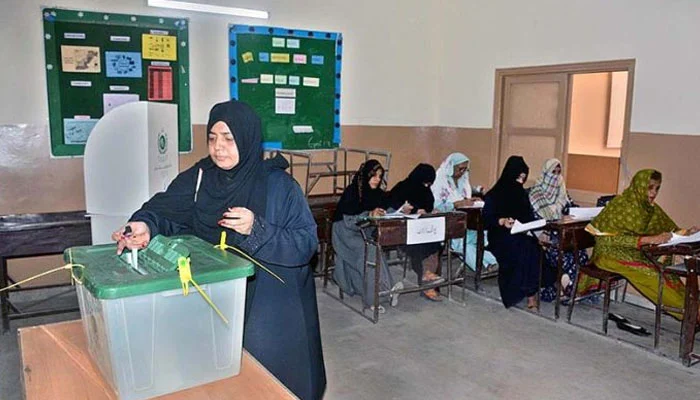KARACHI: On Monday, the Pakistan People Party (PPP) exulted in their resounding triumph in Karachi, having asserted their ascendancy in the municipal karachi by-elections of the bustling port metropolis.
With 98 union council precincts secured following the informal, unofficial by-election results—conducted the previous day—PPP’s overarching stance has solidified, edging it closer to the mayor’s chair.
Of the aggregate 246 seats spanning Karachi, results for 240 have been proclaimed, while the Election Commission of Pakistan (ECP) has deferred the announcement of the residual six, encompassing five from district west and one from district east.
Jamaat-e-Islami (JI) has attained second place, while Pakistan Tehreek-e-Insaf (PTI) occupies the third rank with 89 and 42 respective seats in the provincial capital.
Other political factions garnering seats in Sindh’s local body elections include Pakistan Muslim League-Nawaz (PML-N) with seven seats, Jamiat Ulema-e-Islam (JUI) with two, and one seat each for Tehreek-e-Labbaik Pakistan and an independent contender.
PPP Chairman Bilawal Bhutto-Zardari conveyed his gratitude in response to the party’s by-election success, dubbing it a “momentous accomplishment.”
Via Twitter, the party disseminated Bilawal’s statement following the victory.
“From Karachi to Kashmore, the populace has once more entrusted the PPP. It is a momentous accomplishment that all the district chairpersons, including Karachi and Hyderabad, will be jiyalas (PPP aficionados),” the PPP chairman stated.
He attributed this victory to the people’s confidence, the sacrifices of the party’s martyred leaders and workers, as well as the unwavering determination of supporters.
Bilawal asserted that his party’s adherents now shoulder heightened responsibilities, as their credo is to serve the populace indiscriminately.
He has instructed union council chairpersons and councilors to integrate every thoroughfare and community of the province into the developmental process.
“Party-elected representatives should bear in mind that every street houses a Shaheed Benazir Bhutto dwelling, and every neighborhood belongs to the leader of the people [PPP founder Zulfiqar Ali Bhutto],” he emphasized.
The PPP chairman asserted that each ordinary Pakistani’s home is as precious to him as Bilawal House, requesting his party’s supporters to establish a benchmark in public service.
Results of Local Body Karachi By-Elections in Sindh: PPP Claims Seven Seats, JI Secures Five, PTI Wins Two
The News reports that among the 15 general member seats subjected to by-polls in various city wards, PPP candidates claimed seven, JI candidates secured five, PTI candidates won two, and a PML-N candidate obtained one, according to the informal results available at the time of filing.
By-elections took place for 63 local body seats across five divisions: Karachi, Hyderabad, Sukkur, Jacobabad, Shikarpur, Ghotki, and Khairpur, with sporadic occurrences of violence.
Polling commenced at 8 a.m. and persisted until 5 p.m. without interruption. The police reported that the situation in New Karachi’s Rasheedabad UC-13 Ward 1, Bihar Colony, and UC-2 remained stable despite minor incidents.
In Karachi, a JI candidate emerged victorious in UC No 6 of North Nazimabad in District Central. Faisal Naseem accumulated 4,055 votes, while PPP’s runner-up candidate Abid Shahid procured 1,169 votes. PTI’s candidate Muhammad Aameen ranked third with 1,027 votes.
In UC-2 Orangi District West in Karachi, Noorul Islam of JI triumphed with 4,778 votes. PPP’s candidate Muhammad Aleem trailed as the runner-up with 3,571 votes. In UC-1 of Orangi in District West, Muhammad Amir of PPP seized victory with 2,935 votes, while PTI’s candidate Shakeel Ahmed placed second with 2,925 votes. In UC-8 Mominabad of District West, PPP’s candidate Arshad Khan claimed victory with 2,664 votes, while PTI’s Shair Hussain secured the second position with 1,380 votes. In UC-8 Landhi in District Korangi, Muhammad Ayub Abbasi of JI emerged victorious with 1,695 votes, while Asim Khan of PTI placed second with 826 votes.
Following unrest in Karachi’s Bihar Colony, Sindh PTI’s Member Provincial Assembly Abdur Rasheed staged a demonstration.
“I was [verbally] assaulted at the gate upon exiting the polling station. I entered the polling station after displaying my card and surrendering my mobile phone to the officials,” he recounted.
In addition to Karachi, by-elections were also conducted on several seats in Hyderabad, Sukkur, Jacobabad, Shikarpur, Ghotki, and Khairpur. Polls on these seats had been previously deferred due to multiple factors, including the death of some candidates.
For the by-elections, the ECP established 147 polling stations in 17 districts where Sindh Police personnel were deployed for security duties.
As per unofficial and unconfirmed results, the PPP secured two of the five LG seats in Hyderabad. PTI and an independent candidate each won one seat in the city, while the outcome of one UC remained to be announced.
Hyderabad hosted elections in 17 districts across four divisions for a total of 38 seats of chairpersons, vice-chairpersons, district council, and general members. In the Sukkur Division, voters exercised their right to elect one chairperson, one vice-chairperson, and one general member; one UC chairperson, one vice-chairperson, and one general member in the Ghotki district; and two general members in the Khairpur district.
In the Nawabshah Division, a by-election was held for one seat of chairperson and vice-chairperson of UC Naushahro Feroze, one seat of general member in Shaheed Benazirabad, and one seat of general member in Sanghar. In the Larkana Division, elections were held for one general member each in Jacobabad, Shikarpur, and Kashmore districts.
JI and PPP hurl accusations against each other
At an impromptu press conference late on Sunday night, PPP Karachi President Saeed Ghani declared that the People’s Party’s nominees had achieved success in five union committees in Karachi by-elections. He alleged that JI had expended donations collected on religious grounds to finance its election campaign.
Ghani credited the PPP’s victories to the Sindh government’s public service endeavors to develop Karachi. He advised JI to accept the election results rather than attempting to discredit the election process. He alleged that JI supporters had assaulted and injured PPP activists during the by-elections. Ghani affirmed that the next mayor of Karachi would be a PPP member.
At a press conference, Karachi JI chief Hafiz Naeemur Rehman asserted that his party had won eight of the 11 union committees (UCs) in Karachi by-elections with a comfortable margin. However, he claimed that state machinery was being flagrantly utilized to manipulate the results in PPP’s favor.
Rehman accused the polling officers at a school in Ward 1 of UC 13, New Karachi Town, of sealing ballot boxes prematurely and without showing them to polling agents. He also claimed that a similar incident occurred at another school in the same UC, with PPP workers found operating there.
He charged that Presiding Officer Khurrum Lakhu, in collusion with police officials at UC 13 of New Karachi Town, denied entry to JI polling agents. Furthermore, Presiding Officer Kamran Raza at a school in the same UC allegedly facilitated PPP hooligans in casting fraudulent votes despite protests.
Rehman alleged that at polling station number 38, Zaffar Muawia served as the presiding officer in place of the ECP appointee Muhammad Shahid. In UC 6 of North Nazimabad, he stated that ballot papers were issued without signatures and stamps at polling station number 30. He also said that PPP leader Shahzaib Satti and others attacked the JI’s camp in UC 3 of the same town, but no action was taken.
Overall, the by-elections featured a complex interplay of political maneuvering and contentious results. The PPP’s success in Karachi showcases the intricacies of local politics, with various parties vying for influence in a rapidly changing landscape. The triumphs and challenges experienced by each party during this electoral process highlight the dynamic nature of politics in Pakistan’s diverse districts.




